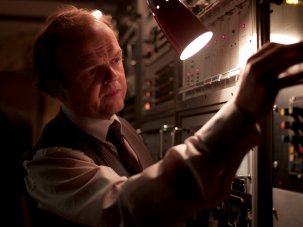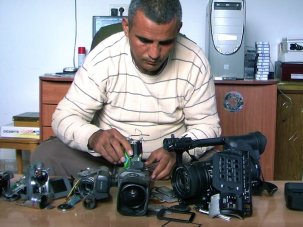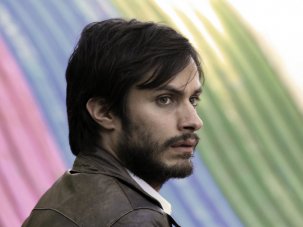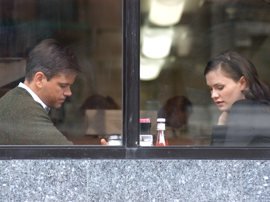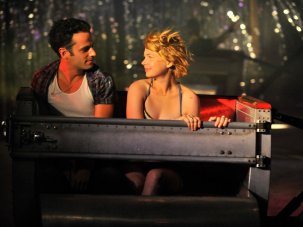Full web edition
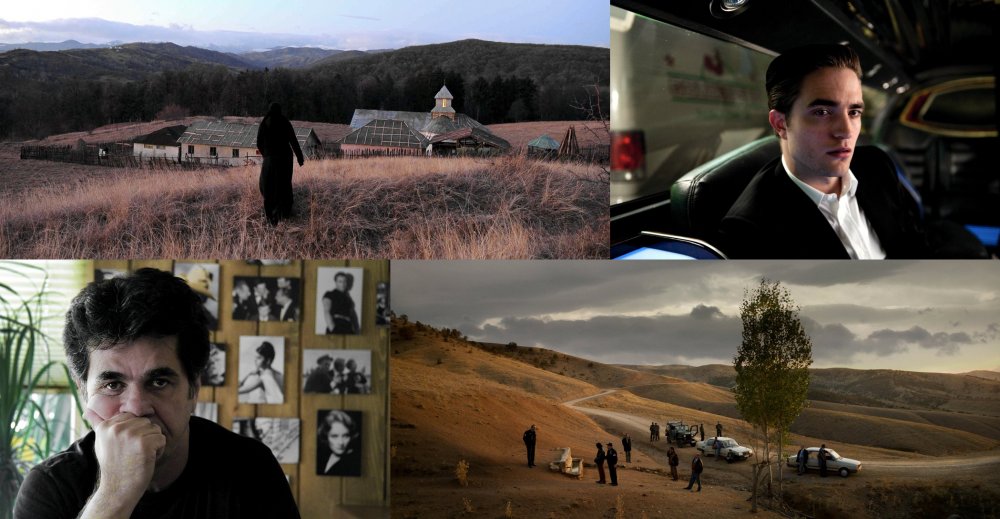
Clockwise from top left: Beyond the Hills; Cosmopolis; Once Upon a Time in Anatolia; This is Not a Film.
Amy Taubin
Critic, USA
Cosmopolis
David Cronenberg
The Gatekeepers
Dror Moreh, Israel/France/Germany/Belgium
Beasts of the Southern Wild
Benh Zeitlin
Amour
Michel Haneke
Memories Look at Me (Ji yi wang zhe wo)
Song Fang, China
Highlights
It was a very good year, with far too many fine movies to fit on a top ten, let alone a top five. I was heartened by the number of terrific movies by female directors: Yesim Ustaoglu’s Araf: Somewhere in Between, Chantal Akerman’s Almayer’s Folly, Sally Potter’s Ginger & Rosa, and the previously mentioned Memories Look at Me by Song Fang.
And despite the proliferation of digital junk, there was a wonderful array of small American independent movies: Dan Sallitt’s The Unspeakable Act, Andrew Seman’s Nancy Please, Tim Sutton’s Pavilion, Keith Miller’s Welcome to Pine Hill, Noah Baumbach’s Frances Ha, the late, great Mike Kelley’s Mobile Homestead documentaries; and, although it’s little more than a sketch for a Brooklyn remake of Celine and Julie Go Boating, Lisa Duva’s smart, exhilarating Cat Scratch Fever.
Matthew Taylor
Critic, UK
No
Pablo Larraín
Ingeniously conceived, Larraín’s snapshot of media-massaged people power is a brilliant capper to a trio of films that, through their formal disparities, reframe a country’s rupture in audacious fashion.
Tabu
Miguel Gomes
Like Larraín, Gomes appropriates the filmmaking of yesteryear, but both films are far from empty nostalgic exercises. Dazzling, playful and plangent – and with a use of Phil Spector to rival Scorsese’s.
Cosmopolis
David Cronenberg, Canada/France/Portugal/Italy
Cronenberg’s eerie DeLillo adaptation is the best meeting of creative sensibilities in an adaptation since the Coens and Cormac McCarthy.
The Hunt
Thomas Vinterberg, Denmark/Sweden
Vinterberg’s best since Festen – a lacerating and wry witch-hunt drama full of outstanding performances.
Nostalgia for the Light
Patricio Guzmán
The cosmos answers to earthbound trauma: Guzmán’s affecting docu-essay could play on a double bill with The Tree of Life.
Highlights
Great reissues of Laura, L’Atalante and The Life and Death of Colonel Blimp; BFI Southbank’s Carl Dreyer season (including a staggering first viewing of Gertrud); bingeing on Hitchcock; Mark Cousins’s The Story of Film on DVD; Raiders of the Lost Ark in IMAX; Repo Man on Blu-ray.
David Thompson
Critic and documentarist, UK
The Kid with a Bike (Le Gamin au vélo)
Jean-Pierre & Luc Dardenne, Belgium/France/Italy
After the unconvincing The Silence of Lorna, the Dardennes returned to their old form in this superbly judged film, utterly convincing in every frame.
Moonrise Kingdom
Wes Anderson
Perhaps this struck a chord in dealing with a time I lived through, and in its exuberant use of Britten’s music, but I also loved it for its great humour and surprising (for Wes Anderson) humanity.
Holy Motors
Leos Carax, France/Germany
Carax vindicated his early praise in this belated return to the big screen with a full-length film – more a catalogue of obsessions than a real narrative, but brilliantly diverting for all that.
Amour
Michael Haneke
I confess to admiring more than loving Haneke’s films before this one, which dispenses with the pompous moral lessons to depict the agonies of the ageing with an unflinching exactness.
The Master
Paul Thomas Anderson
PTA strikes again, pushing cinema into thrilling, cliché-free new realms of intensity, making him one of the classiest, most visionary filmmakers out there.
Highlights
Not so many this year, other than the wonderful films mentioned above, plus quite a few also-rans. One great revival: Ordet, a staggering work of art, no question, shown in a marvellous digital restoration at BFI Southbank. Though in contrast, seeing The Master in 70mm showed that format still to be supreme, if sadly going the way of the Coelacanth. Fascinating to see some of the Hitchcock silents restored with mostly enjoyable new soundtracks performed live: best print – The Pleasure Garden; worst music – Downhill.
I couldn’t see much in the LFF this year, but the rediscovery of Herbert Brenon’s The Spanish Dancer was wonderful fun – it was as if this 1923 film had been made yesterday. Grover Crisp’s post-Festival lecture on film restoration was inspiring – if all the major studios employed someone as informed, sensitive and energetic as him, the future of Hollywood cinema at least would seem far more assured.
Paul Tickell
Director and critic, UK
Once Upon a Time in Anatolia
Nuri Bilge Ceylan
Tabu
Miguel Gomes
Five Broken Cameras
Emad Burnat & Guy Davidi
Alps
Yorgos Lanthimos
Protest Vote (after Frank Zappa): Cinema isn’t dead it just smells funny – and of over-powering marketing like in the ‘auteurisation’ of Nolan, Mendes, Burton et al.
Kenneth Turan
Los Angeles Times, USA
Amour
Michael Haneke
A devastating experience that joins Haneke’s icy, immaculate style to an intrinsically emotional subject: what happens to a lifelong harmonious marriage when the wife suffers a series of debilitating strokes. Shattering performances by Jean-Louis Trintignant and Emmanuelle Riva.
The Gatekeepers
Dror Moreh, Israel/France/Germany/Belgium
Chilling, disturbing, riveting from beginning to end, this documentary portrait of six former heads of Israel’s Shin Bet domestic counter-terrorism agency is potent enough to alter how you see the world.
Lincoln
Steven Spielberg
Spielberg turns on a dime and delivers his most restrained, interior film, while Daniel Day-Lewis surpasses even himself and allows us to see a celebrated figure in ways we hadn’t anticipated.
No
Pablo Larraín
Chilean director Larraín takes a little-remembered event in his country’s history – a 1988 plebiscite on Pinochet’s rule – and turns it into a tangy film that mixes reality and drama to provocative effect.
Silver Linings Playbook
David O. Russell, USA
A David O. Russell movie that – like protagonists Bradley Cooper and Jennifer Lawrence – won’t fit into any box. Dramatic, emotional, wickedly funny, it has the gift of going its own way.
Highlight
‘That Signature Style: The Films of Mitchell Leisen’ – a comprehensive UCLA Film & Television Archive retrospective that made it possible to fully appreciate this most perennially neglected of golden-age Hollywood directors.
Thirza Wakefield
Critic, UK
The Master
Paul Thomas Anderson
For its rich, incandescent cinematography and Jonny Greenwood’s moiling score. Two superlative, absorbed and absorbing performances by Hoffman and Phoenix, playing characters who are always moving, uncontainable in the depressurised, wide-open atmosphere of post-WWII America.
Rust and Bone (De rouille et d’os)
Jacques Audiard, France/Belgium
The Beat That My Heart Skipped showed Audiard’s understanding of relationships and his conception of characters so entire, persuasive and imperfectly appealing that they won’t be left behind with the end credits. The same again here. Frightening, sexy, hostilely visceral: I couldn’t shake the (uneasy) memory of it for at least a fortnight after watching.
Once upon a Time in Anatolia
Nuri Bilge Ceylan
A quieting, crepuscular film about separateness and making sense of human connection. Ceylan’s working men seem to have more in common with the natural world than with each other. An intimate and ageless masterpiece.
The Amazing Spider-Man
Marc Webb, USA
The writing, the 3D effects, the two leads – Andrew Garfield and Emma Stone. Altogether, the most enjoyable, immersive (and natural!) action-hero movie I’ve seen. A worthy remake!
Into the Abyss
Werner Herzog, USA/UK/Germany
Another terrific documentary from Herzog, whose idiosyncratic interview techniques and assemblage of crime-scene video persuade us of the perversity of capital punishment and the immeasurable importance of family in the back and beyond of America.
Highlights
Seeing Bicycle Thieves for the first time as part of Film4’s Summer Screen in August; Wings at the LFF; this year’s digital remasterings – a weird and wonderful set, including Jaws, The Lodger, What Ever Happened to Baby Jane?, The Man Who Fell to Earth and Hobson’s Choice.
Catherine Wheatley
Critic and academic, UK
Amour
Michael Haneke
Beasts of the Southern Wild
Benh Zeitlin
Martha Marcy May Marlene
Sean Durkin, USA
Two Years at Sea
Ben Rivers
Take This Waltz
Sarah Polley, Canada/France
I gave Take This Waltz a rather ambivalent review at the time of its release, but it has stayed with me since, and I’ve had some really interesting, unsolicited correspondence from other women who’ve watched it and had quite a peculiar response to it. One of those instances where a film and one’s opinion of it can really change shape over time.
Highlight
Hitchcock at the BFI. So much fun, if only because (and this despite Vertigo’s Top Ten victory) I’m not sure I met anyone over the course of the three weeks who actually admitted to liking Hitchcock. Didn’t take long for the critical backlash to begin…
Armond White
Critic, CityArts, USA
Unforgivable (Impardonnables)
André Téchiné, France
A tumultuous view of private lives as society and society as family.
The Deep Blue Sea
Terence Davies
Examines the linkage of desire and despair to find the value of personal resurrection.
Sacrifice (Zhao shi gu er)
Chen Kaige, China
The source of culture and morality is made vivid in this most majestic myth.
Damsels in Distress
Whit Stillman
The rare campus-comedy genre visits private worlds that reflect the eccentricities we recognise deep down.
Holy Motors
Leos Carax, France/Germany
An elegy for cinephilia, both sad and euphoric.
Highlights
Two critics summed up 2012. The late Andrew Sarris once said, “Film is the art to which all the other arts aspire”; and Nick James’s S&S Poll observation about “people who are not sure who they are, but who are busy reconstructing themselves and each other to fit a kind of cinema ideal”. Together these statements explain the death of cinephilia as popular passion into shrunken elite culture. May God have mercy on us.
Jason Wood
Critic and programmer, UK
Berberian Sound Studio
Peter Strickland, UK
A remarkable synthesis of sound and vision.
Tabu
Miguel Gomes
A mesmerising meditation on memory. That it wasn’t more widely seen is criminal.
Spring Breakers
Harmony Korine
An elongated version of the promo for Aphex Twin’s ‘Windowlicker’, this is a brilliant and beguiling work from Korine, and a chilling dissection of contemporary culture.
Bill Cunningham New York
Richard Press, USA/France
A sensitive portrait of a sensitive man.
Holy Motors
Leos Carax, France/Germany
Hugely and strangely divisive, but Carax does give us some unforgettable moments.
Highlight
My other moving-image related event is another film, the rather wonderful Make Your Own Damn Art: The World of Bob and Roberta Smith. The film has played to appreciative audiences at selected cinemas – and it is a small joy to behold.
Sam Wigley
BFI News, UK
Tabu
Miguel Gomes
Neighbouring Sounds
Kleber Mendonça Filho
Post Tenebras Lux
Carlos Reygardas
Like Someone in Love
Abbas Kiarostami
Amour
Michael Haneke
Highlights
‘Guilty’ pleasure of the year: Project X, a gob-smackingly unpleasant but exhilarating teen movie in which director Nima Nourizadeh stumbles upon a Boschian vision of hell on earth.
Retrospective of the year: Carl Dreyer at BFI Southbank, from the wonderfully executed tonal shifts of early comedy The Parson’s Widow (1920) to the sublime Gertrud (1964), a chamber work of piercing regret, composed of stillness, flooding white light and incantatory dialogues.
Favourite first-time viewings of the year: Szindbad (1972), Conte d’hiver (1992), La Bête humaine (1938), Repo Man (1984), Finis Terrae (1929), Monsieur Ripois (1954), The Passion of Anna (1969), Le Silence de la mer (1949), Pasolini’s Arabian Nights (1974).
John Wrathall
Sight & Sound, UK
Elena
Andrei Zvyagintsev, Russia/France/USA/Japan
Margaret
Kenneth Lonergan
Everybody Has a Plan (Todos tenemos un plan)
Ana Piterbarg, Argentina/Spain/Germany
The Descendants
Alexander Payne, USA/UK
Michel Petrucciani
Michael Radford, France/Germany/Italy
Highlights
The Great Flood at the London Jazz Festival: Bill Morrison’s astonishing compilation of archive footage of the 1927 Mississippi disaster that sparked a black exodus northwards, with live accompaniment from Bill Frisell and co. A darker mood than the guitarist’s joyful Buster Keaton scores, but just as satisfying.
On the small screen, Vince Gilligan’s Breaking Bad keeps on giving in Season 4 (the latest to reach these shores, though 5 has already screened in the US). Off the back of this, the great Bryan Cranston is starting to get supporting roles in Hollywood thrillers (Argo, Drive), but no mere movie could hope to give an actor a canvas as broad as this on which to chart the incremental corruption of a decent everyman, step by agonising step. And we’re with him every inch of the way.
Most bizarre encounter: An impromptu, interpreter-less dinner with Alexander Zeldovich to discuss his plan to make a London answer to La dolce vita as his follow-up to the extraordinary Target (Mishen).
Barbara Wurm
Critic, Berlin
Tabu
Miguel Gomes
Now, how long did it take to finally be able to say “sooooooooooo cool” again … without the slightest embarrassment?
Za Marksa
Svetlana Baskova, Russia
A largely undiscovered marvel from largely undiscovered contemporary Russia’s political left: the rein(ter)vention of the workers’ unions (film clubs). Stubborn, Brechtian, tragic.
Florentina Hubaldo, CTE
Lav Diaz
Chronic traumatic encephalopathy (CTE) – Lav Diaz’s ode to poverty (the magic of melancholia, even on HD). A commitment.
Che Sau (Motorway)
Soi Cheang, Hong Kong
One fast and straightforward trip into the realm of genre cinema. Tyres, determination, mastery. Call us fetishists. We like it.
differently, Mollusia (anders, Mollusien)
Nicolas Rey
I have seen it three times. I still haven’t seen it. But what I saw came in layers of intelligence and beauty.
Highlights
Call it revival, call it encounter. My personal highlight very undoubtedly was Peter van Bagh – and all the films he brought with him to the IFFR, including his AV-TV-lecture-essay-orgy Faaraoiden maa (Land of the Pharaohs), his educative love story Helsinki, Forever and one big masterpiece in film history, Mikko Niskanen’s Kahdeksan Surmanluotia (Eight Deadly Shots). Peter is visionary in every sense of the word.
Rotterdam was especially special this year anyway (did I mention the fun part: Fuk Fuk à Brasileria!?). The Viennale was special, too. “My name is Miguel Gomes, I am filmmaker, but who cares anyway? The guy that matters, it’s called Manuel Mozos.” Well, I told you that no one is ever cooler than Miguel. Certainly not Manuel, which again doesn’t matter at all, since basically all the Portuguese treasures he chose, above all Trás-Os-Montes by António Reis, brought insight and light to this gloomy world of theirs (and ours).





